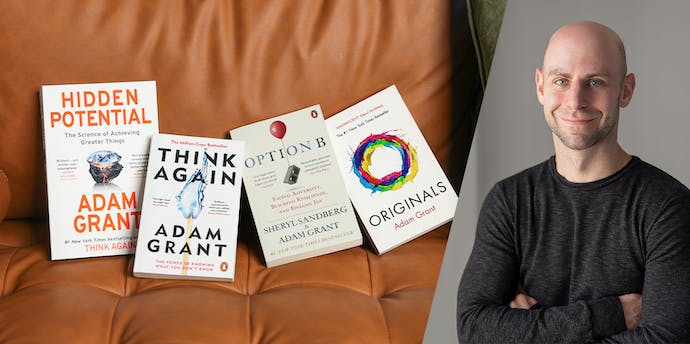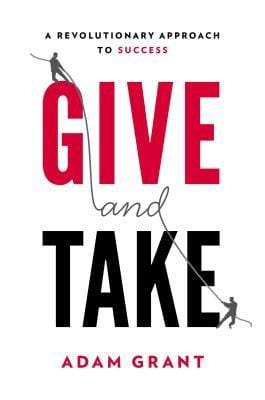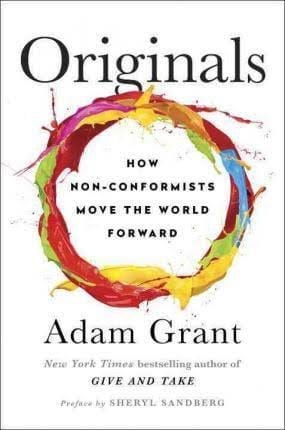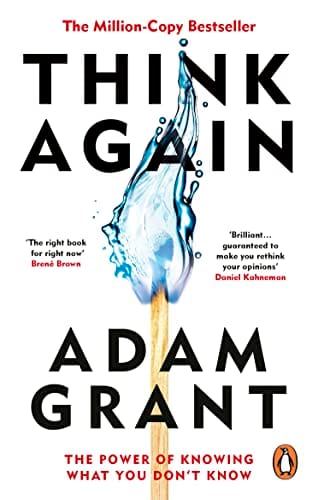Growth Minded Entrepreneurs! Read Adam Grant's Books In This Order
ChatGPT Discover key entrepreneurial insights from Adam Grant in our latest post. Learn about generosity, original thinking, resilience, and effective networking for building successful businesses. Dive into Grant's "Give and Take," "Originals," and more for transformative business strategies.

Adam Grant's insights offer a wealth of knowledge for entrepreneurs. His emphasis on the power of generosity, as explored in "Give and Take," teaches the value of contributing to others without the immediate expectation of return, fostering a more collaborative and trusting business environment. In "Originals," Grant highlights the importance of nurturing original thinking and innovation, which is essential for entrepreneurs in a competitive market. This idea extends into his work in "Think Again," where he advocates for the importance of flexibility in thinking, the willingness to rethink, and the readiness to embrace new perspectives and ideas.
Grant also delves into understanding motivation and meaning in the workplace, guiding entrepreneurs to create more engaging and fulfilling environments for their teams. His focus on resilience and learning from failure is crucial for entrepreneurs, who often navigate high-risk landscapes. Grant's insights into effective networking and collaboration are invaluable for building and growing a business.
Finally, his studies on psychological safety emphasize the importance of creating environments where team members feel free to take risks and express ideas, fostering a culture of open communication and innovation. These principles are fundamental for entrepreneurs aiming to build a successful and sustainable business.
Here's the order I recommend to read the books by Adam Grant:
- Give and Take
- Originals
- Think Again
- Hidden Potential

Exploring Adam Grant's "Give and Take" Through an Entrepreneurial Lens
In the competitive arena of entrepreneurship, success is often equated with aggression, assertiveness, and taking. However, Adam Grant's groundbreaking book, Give and Take: Why Helping Others Drives Our Success, challenges this notion and opens up a new paradigm for entrepreneurs. As a community that thrives on innovation and forward-thinking, it's crucial for us, as entrepreneurs, to dive into Grant's perspective and uncover the power of being a giver in business.
Givers, Takers, Matchers: Understanding the Trio
At the heart of Grant's thesis lies a simple yet profound categorization: people in the workplace are either givers, takers, or matches.
- Givers give more than they get, putting others' needs first.
- Takers aim to get more than they give, prioritizing their interests.
- Matchers balance giving and taking, seeking an equitable exchange.
Why Givers Triumph
Contrary to the cut-throat business stereotype, Grant's research reveals that givers often emerge as the most successful. This revelation is a game-changer for entrepreneurs.
The Entrepreneurial Advantage of Being a Giver
- Expansive Networking: Givers excel in creating vast, effective networks. Unlike mere contact collection, givers build deep, trust-based relationships. For entrepreneurs, such a network is not just a Rolodex of contacts but a web of support, opportunity, and collaboration.
- Enhanced Team Dynamics: Givers contribute positively to team collaboration. A giving culture can significantly amplify collective performance in startups where resources are lean and teamwork is paramount.
- Building Trust and Reputation: A giver's reputation for generosity and reliability can become their most vital asset. In the entrepreneurial world, where trust is gold, being known as a giver can open doors to new partnerships and loyal customer bases.
- Long-Term Success: While givers might seem to lag in the short run, their long-term success trajectory is impressive. Entrepreneurs know the value of playing the long game – building sustainable, meaningful businesses that stand the test of time.
Applying 'Give and Take' Principles in Entrepreneurship
1. Cultivate Authentic Relationships
Focus on building relationships that are genuine and generous. In business, this translates to creating bonds with clients, partners, and team members that go beyond transactions.
2. Embrace Mentorship and Support
Being a mentor and supporting others in the community isn’t just about altruism; it's about fostering a healthy entrepreneurial ecosystem where everyone can thrive.
3. Choose Collaboration Over Competition
Promote a culture of collaboration. Two heads are often better than one in the rapidly evolving business world. Collaborative efforts can lead to innovative solutions that a competitive mindset might miss.
Creating a Culture of Giving in Your Venture
As entrepreneurial leaders, we have the power to shape our organizational culture. By nurturing a culture of giving, we're not just fostering a positive environment but building a more innovative, resilient, and ultimately successful business.
Conclusion: The Giving Edge
Adam Grant's Give and Take isn’t just a book; it's a blueprint for a new way of doing business. As entrepreneurs, we have the unique opportunity to redefine success – not as the result of cutthroat competition but as the fruit of collaboration, generosity, and genuine relationships. Let's embrace being givers in our entrepreneurial journeys and watch as this approach transforms our businesses and the communities we serve.

Insights from Adam Grant's "Originals: How Non-Conformists Move the World"
In the entrepreneurial realm, breaking free from conventional wisdom isn’t just an asset; it’s a necessity. Adam Grant's Originals: How Non-Conformists Move the World serves as a clarion call for entrepreneurs to embrace non-conformity and foster innovation. This book offers invaluable lessons on championing new ideas, fighting groupthink, and ultimately moving the world.
Championing Innovation
As entrepreneurs, our primary role often revolves around introducing new ideas. Grant emphasizes not just the creation but also the effective communication of these ideas. Your ability to articulate your vision can make or break your entrepreneurial journey.
Combating Groupthink
In the startup ecosystem, the echo chamber effect can stifle innovation. Grant’s insights into fighting groupthink are crucial. Encouraging diverse perspectives within your team enriches your solutions and guards against blind spots.
Balancing Risk with Caution
Entrepreneurs are stereotyped as reckless risk-takers. Grant dispels this myth, highlighting that the most successful originals balance risk with caution. It’s about making calculated moves and knowing when to play it safe.
Timing is Everything
Understanding the right moment to act is critical. Whether launching a product or scaling your business, the timing between a flop and a phenomenon can differ.
Valuing Minority Opinions
The courage to advocate for and act on unconventional ideas is at the heart of entrepreneurial success. Grant's exploration of this trait is a testament to the power of thinking differently and boldly.
Applying Original Thinking in Your Entrepreneurial Journey
1. Foster a Culture of Innovation
Create an environment where challenging the status quo is the status quo. Encourage your team to think differently and reward original ideas.
2. Embrace Calculated Risk-Taking
Adopt a balanced approach to risk. Use data and experimentation to validate your ideas, and be willing to pivot based on what you learn.
3. Master the Art of Timing
Develop a keen sense of market trends and consumer readiness. Being too early or too late can render even the best ideas ineffective.
4. Stand Up for Bold Ideas
Don’t be afraid to back ideas that might initially seem outlandish. Today's oddity can be tomorrow’s industry standard.
5. Build a Diverse Team
Diversity in thought and background breeds innovation. A team that sees the world differently can find solutions that others might miss.
Conclusion: Embracing Your Originality
Originals isn’t just a manual for non-conformity; it's a blueprint for revolutionizing how we approach entrepreneurship. By understanding and applying the principles of original thinking, we can transform our businesses and the industries we operate in. Let's not just be entrepreneurs; let's be originals, moving the world one innovative idea at a time.

Embracing the Lessons from Sheryl Sandberg and Adam Grant's Insightful Book
Entrepreneurship is a journey defined as much by its peaks as by its valleys. In their influential book, Option B: Facing Adversity, Building Resilience, and Finding Joy, Sheryl Sandberg and Adam Grant provide a compelling guide for navigating the choppy waters of entrepreneurial challenges. This exploration is not just about surviving setbacks; it's about thriving amidst them.
Understanding the Entrepreneurial Rollercoaster
Dealing with the Inevitable Setbacks
As entrepreneurs, we're no strangers to hurdles. Setbacks, both big and small, are par for the course. Sandberg and Grant's insights into handling adversity offer a powerful toolkit for maintaining our course even in the stormiest of times.
The Art of Building Resilience
Resilience is the entrepreneur's armor. It's not inherent but developed. This book guides us in fortifying ourselves against the inevitable challenges, ensuring that we can withstand and grow from these experiences.
Finding Joy Amidst Struggles
In the relentless pursuit of success, it's easy to lose sight of the joy in our entrepreneurial journey. Sandberg and Grant remind us that finding meaning and happiness, even in small victories and everyday tasks, is crucial for sustained motivation and success.
Learning from Failures
Failure is a stern but effective teacher. The authors encourage us to embrace our failures, to see them not as the end but as stepping stones to better strategies and stronger comebacks.
The Strength of Support Systems
No entrepreneur is an island. The book underscores the importance of cultivating a robust support network — mentors, peers, and a supportive team. These relationships are our safety nets and sounding boards.
Harnessing 'Option B' in Your Business Endeavor
1. Cultivate Resilience Actively
Recognize that resilience is a skill to be developed. Practice mindfulness set realistic goals, and maintain a positive, problem-solving attitude.
2. Embrace and Learn from Failures
See every setback as a learning opportunity. Analyze your failures, extract vital lessons, and use these to refine your approach and strategy.
3. Keep the Flame of Passion Alive
Connect regularly with the core reasons why you started your business. Let this passion be your guiding light, especially during challenging times.
4. Build and Lean on Your Support Network
Invest time in building a network of mentors, advisors, and peers. Don’t hesitate to seek support, advice, or a listening ear.
5. Prioritize Personal Well-being
Remember, your business needs you at your best. Prioritize your health and well-being to maintain your focus and drive.
Conclusion: Thriving Through Adversity
Option B is more than a book; it's a roadmap for resilience in the entrepreneurial landscape. It teaches us that while adversity is inevitable in our journey, our response to these challenges defines our path. By embracing these principles, we can transform our adversities into opportunities for growth, innovation, and sustained success.

Harnessing the Power of Intellectual Flexibility in Business
In a world where change is the only constant, the ability to rethink and adapt is not just a skill but a necessity for entrepreneurs. Adam Grant's insightful book, Think Again: The Power of Knowing What You Don't Know, offers a treasure trove of wisdom on rethinking. This isn't just about being open to new ideas; it's about actively challenging our beliefs and strategies to stay ahead in the entrepreneurial game.
Embracing the Art of Rethinking in Entrepreneurship
The Value of Intellectual Humility
Acknowledging what you don't know is a strength, not a weakness. Intellectual humility paves the way for lifelong learning, a non-negotiable in the entrepreneurial journey. Recognizing our knowledge gaps helps us stay curious, adaptable, and open to new ideas.
Challenging Our Confirmation Biases
As entrepreneurs, we're often guilty of favoring information that confirms our pre-existing beliefs. Grant emphasizes the importance of stepping out of this echo chamber. Seeking diverse perspectives isn't just enlightening; it's a business imperative.
Cultivating a Culture of Open-Mindedness
A culture encouraging questioning and open-mindedness can become your company's biggest asset. It fosters innovation, enhances decision-making, and enables your team to pivot quickly in response to market changes.
Effective Communication for Persuasion
Understanding and valuing others' viewpoints enriches our perspective and makes us better communicators. This skill is invaluable in the world of entrepreneurship, where convincing others is part of the daily grind.
Applying 'Think Again' Principles for Business Success
1. Stay Eternally Curious
Never lose the thirst for learning. Encourage this curiosity within your team as well. It keeps your business agile and responsive to new opportunities and challenges.
2. Foster Open Dialogue
Promote a workplace where challenging ideas and brainstorming are part of the norm. This approach can lead to innovative solutions that set your business apart.
3. Regularly Revisit Your Strategies
Make it a habit to reassess your business strategies and goals periodically. This practice ensures you remain relevant and aligned with the market’s needs.
4. Embrace Diverse Opinions
Actively seek out and consider viewpoints different from your own. This broadens your perspective and helps identify blind spots in your business approach.
5. Lead by Example
Model the behavior of rethinking and openness. Show your team that adapting and changing opinions based on new evidence or perspectives is acceptable and encouraged.
Conclusion: The Transformative Power of Rethinking
Think Again is more than just a book; it's a roadmap for entrepreneurial innovation and success. By embracing the rethinking principles, we position ourselves and our businesses for enduring success in a rapidly evolving world. Remember, the ability to rethink and adapt is the entrepreneur's superpower in navigating the complexities of the business world.

Unleashing Hidden Potential: A New Paradigm for Entrepreneurial Success
In the dynamic world of entrepreneurship, where innovation and adaptability are paramount, understanding the true nature of potential is crucial. Adam Grant's seminal work, "Hidden Potential," presents a transformative perspective that reshapes our understanding of success and Talent, offering invaluable insights for entrepreneurs looking to navigate the challenging yet rewarding landscape of business innovation.
Challenging Conventional Wisdom on Talent and Success
Redefining Talent: Traditional views often attribute entrepreneurial success to innate genius or exceptional Talent. However, Grant's thesis in "Hidden Potential" upends this notion, arguing that the real keys to achievement lie not in inherent abilities but in developing character skills, the sustenance of motivation, and the creation of opportunity-enabling systems. Grant aptly puts it: “Talent is not a destination. It’s a journey of continuous improvement.”
The Three Pillars of Potential:
- Character Skills Development: Resilience, adaptability, empathy, and other character skills are vital in the entrepreneurial journey. Unlike fixed traits, these skills can be developed and honed over time.
- Sustaining Motivation: Long-term success in entrepreneurship hinges on maintaining intrinsic motivation. It's about pursuing goals that resonate personally, not just chasing external rewards.
- Designing Opportunity Systems: Entrepreneurs must create environments that foster growth and learning, particularly for those often overlooked. This means building inclusive, supportive business cultures that encourage innovation and growth.
The Entrepreneurial Journey: Learning and Development as Key Drivers
Effort and Resilience Over Innate Genius: Grant's emphasis on effort and resilience is particularly relevant for entrepreneurs. The path to business success is often non-linear, with challenges and setbacks. Viewing these as opportunities for growth and learning is crucial. Grant encourages this mindset: “The measure of our success is not whether we avoid failures, but whether we learn from them.”
Continuous Learning and Adaptation: The entrepreneurial landscape is constantly evolving. Staying relevant and successful requires a commitment to constant learning and adaptation. Grant's approach suggests that acquiring new skills and adapting to market changes is as important as achieving specific business milestones.
Practical Implications for Entrepreneurs
Developing a Growth Mindset Culture
Fostering an Environment of Continuous Improvement: Entrepreneurs should cultivate a workplace culture that values continuous learning and improvement. This involves encouraging team members to take on new challenges, learn from failures, and view every experience as an opportunity for growth.
Mentorship and Training Programs: Implementing robust mentorship and training programs can significantly impact skill development and employee growth. This aligns with Grant's emphasis on designing opportunity systems, ensuring all team members have the resources and support to develop their potential.
Inclusive Leadership and Opportunity Creation
Building Diverse and Inclusive Teams: Diversity in thought and experience is a treasure trove of potential. Entrepreneurs should strive to make teams that reflect various perspectives, backgrounds, and skills. This not only fosters innovation but also creates an environment where everyone has the chance to contribute and grow.
Creating Platforms for Underrepresented Voices: An essential aspect of Grant's philosophy is creating opportunities for those often overlooked. Entrepreneurs can apply this by actively seeking out and supporting underrepresented voices within their industry through partnerships, mentorship programs, or community engagement.
Case Studies and Real-World Examples
Incorporating case studies from various industries, from tech startups to traditional manufacturing, can provide practical examples of how embracing a focus on learning and development over inherent Talent can lead to substantial business successes. These stories should illustrate how different entrepreneurs overcame challenges, adapted to market changes, and cultivated a culture of continuous learning within their organizations.
Encouraging a Paradigm Shift in Entrepreneurial Thinking
The Importance of Resilience and Adaptability: In the unpredictable business world, the ability to adapt and bounce back from setbacks is invaluable. Entrepreneurs must recognize the importance of these qualities, nurturing them within themselves and their teams.
Redefining Success Metrics: Success in entrepreneurship should be measured financially and in terms of growth, learning, and developing one’s team and business practices. Grant says, “Our greatest achievements lie not in never falling, but in rising every time we fall.”
Conclusion: A Call to Action for Entrepreneurs
Adam Grant's "Hidden Potential" is not just a theoretical exploration; it's a practical guide that challenges entrepreneurs to rethink the foundations of success. Entrepreneurs can build resilient, adaptable, and innovative businesses by developing character skills, sustaining motivation, and creating inclusive opportunities. This approach does more than drive business success; it fosters a culture of continuous growth and learning, setting the stage for enduring impact in the entrepreneurial world.
In conclusion, embracing the "Hidden Potential" principles can be a game-changer for entrepreneurs. It's a call to move beyond the conventional wisdom of innate Talent and genius and recognize the extraordinary potential in the journey of learning and development. As entrepreneurs, the opportunity to redefine success and unlock the true potential within ourselves and our teams is not just a possibility; it's a responsibility. Let's embark on this journey together, redefining what it means to succeed in the ever-evolving entrepreneurship world.



